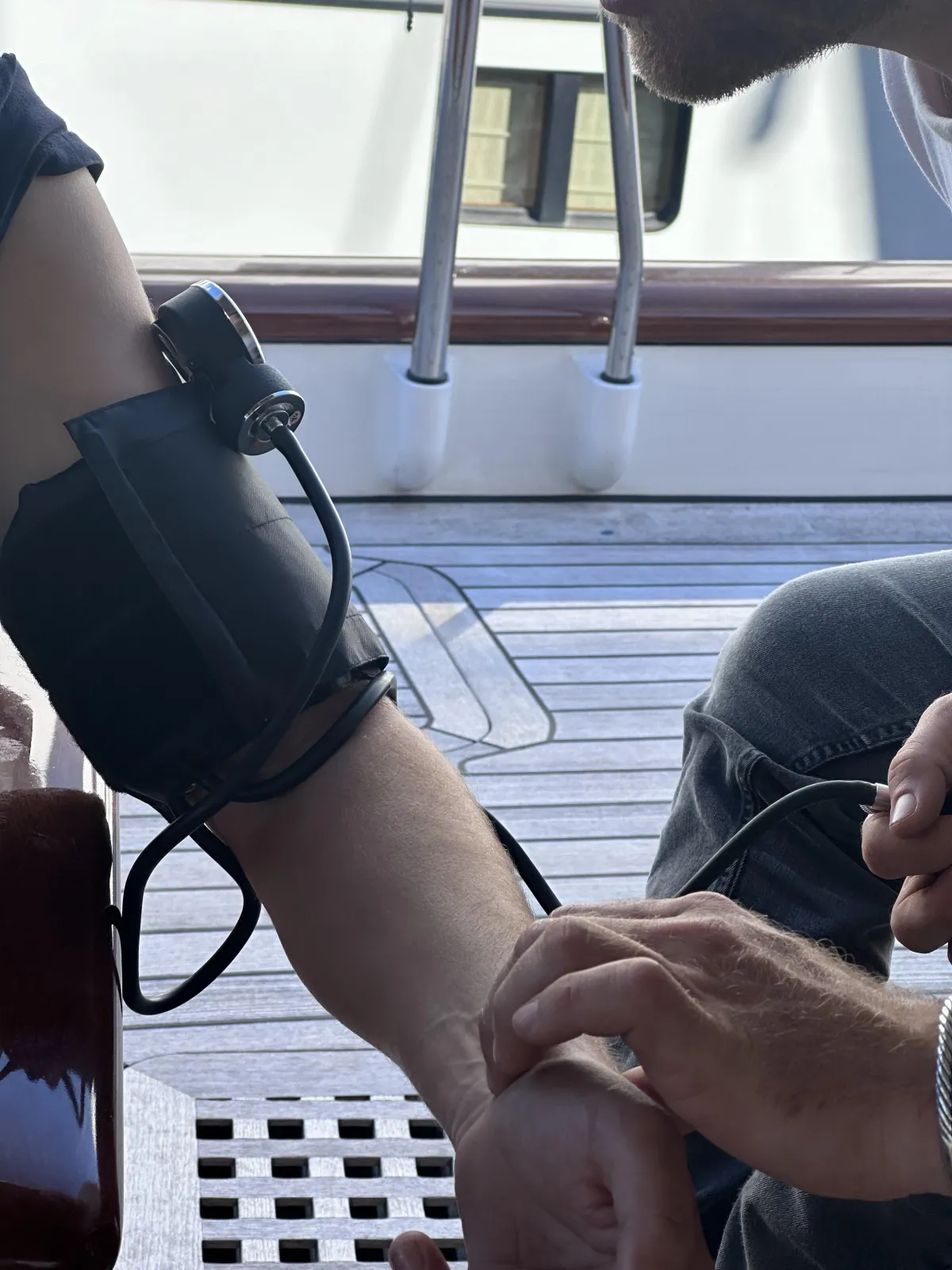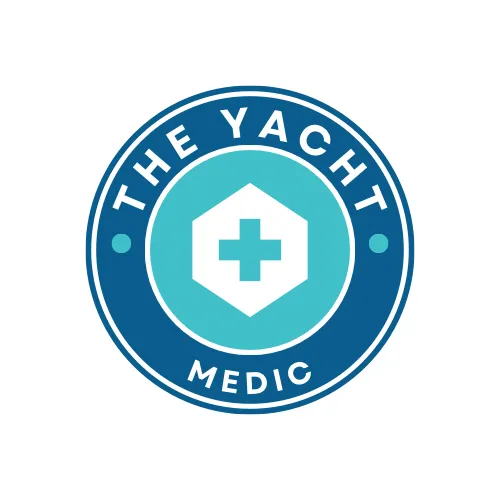See Our Latest Blogs
Beyond Boundaries, Beyond Rescue
Mastering Self Reliance At Sea

Superyachts and Blood Pressure
Why Superyacht Captains Have High Blood Pressure—And How to Fix It Before It’s Too Late
Let’s be blunt—most superyacht captains are walking heart attacks waiting to happen. I’ve seen it firsthand. You’re running a floating luxury hotel, a high-performance race yacht, and a multi-million-dollar business, all while being a therapist for your crew and a mind reader for your guests. The pressure is insane.
And it’s literally killing you.
High blood pressure isn’t just a minor inconvenience—it’s the first step toward a stroke, heart attack, or cognitive decline. Yet most captains don’t realize how deep the damage goes. You might feel fine now, but when your arteries harden, your body won’t send you a warning.
The Silent Killers: What You Haven’t Been Told
1. You’re Functioning on Fake Energy (and It’s Destroying Your Blood Vessels)
That triple espresso isn’t energy. That adrenaline rush before docking isn’t energy. That post-midnight stress scroll through your emails isn’t energy.
Your body is hijacking stress hormones to keep you going. And every time you do it, your blood vessels constrict, your heart pounds harder, and your risk of a cardiac event skyrockets.
🚨 Reality Check: Long-term stress rewires your nervous system. It’s why so many captains step off yachts after years of service and suddenly get diagnosed with hypertension, heart disease, or chronic fatigue. The damage was brewing the whole time.
2. Your Sleep Isn’t Just Bad—It’s Dangerous
Captains often say, “I’m used to getting by on 4–5 hours of sleep.”
That’s not a flex. That’s a time bomb.
Here’s what you’re really doing:
Less than 6 hours of sleep = a 200% increased risk of a fatal heart attack.
Poor sleep quality leads to arterial stiffness, making high blood pressure irreversible.
Sleep deprivation turns your blood pressure regulation OFF, meaning your heart is under strain 24/7.
And yet, captains push through it, assuming they’ll “catch up” on a day off. You can’t. The damage is cumulative.
🚨 Reality Check: Captains with consistently poor sleep are at a much higher risk of dying young than their crew—despite the fact that crew work insane hours. Why? Because YOU never stop being in charge.
3. You’re Dehydrated—And It’s Worse Than You Think
Ever get that low-grade headache after a long day at the helm? That’s not just stress—that’s dehydration-induced blood thickening, making your heart work harder.
Most captains drink coffee, tea, and alcohol, but not enough water. And in a high-salt, hot-weather environment, you’re operating in a constant state of dehydration.
What happens when you're dehydrated?
Blood thickens → Heart pumps harder → Blood pressure rises.
Chronic dehydration leads to kidney strain, which further spikes BP.
Your stress tolerance plummets—meaning every minor inconvenience feels worse than it should.
🚨 Reality Check: If you’re only drinking 1–2 liters of water a day, you’re already 20–30% below optimal hydration. That’s enough to increase blood pressure by 5–10 mmHg daily.
The Fix: How to Take Control Before Your Body Forces You To
Step 1: Hack Your Nervous System First, Not Your Schedule
Breathe, don’t react. Use box breathing (4-4-4-4 seconds) before high-stress moments. This lowers BP in real-time.
Cold exposure = instant BP reduction. A 30-second cold shower activates parasympathetic recovery, lowering stress hormones.
HRV tracking (via Whoop/Oura/Garmin) will show you if you’re in chronic stress mode—fix this, and your BP normalizes.
Step 2: Rethink Sleep (Even If You Think You Can’t)
90-minute cycles matter more than total hours. Prioritize at least 2 full deep-sleep cycles per night—4.5 hours minimum.
Tech-free wind-down: No emails, no drama, no blue light 60 mins before bed.
Magnesium + Glycine before sleep can significantly improve deep sleep and lower BP overnight.
🚨 Reality Check: Sleep-deprived captains have testosterone levels equivalent to men 10 years older. You’re literally aging yourself by neglecting sleep.
Step 3: Hydration & Nutrition—You’re Fueling a High-Performance Machine
Water first, coffee second. Every espresso should be matched with 500ml of water.
Electrolytes over energy drinks. Your crew drinks them, you should too. Aim for potassium + magnesium-rich options.
Skip the salt overload. Ditch high-sodium, processed meats and opt for potassium-rich foods (avocado, banana, dark leafy greens).
🚨 Reality Check: The ideal sodium-to-potassium ratio for heart health is 1:3—most captains are running at 5:1 in the wrong direction.
Resources & Further Reading
Why We Sleep – Matthew Walker (If you read one book on health, make it this one.)
The Oxygen Advantage – Patrick McKeown (How to use breathwork to lower BP & stress.)
The Huberman Lab Podcast – Dr. Andrew Huberman (Deep dives into sleep, hydration, and stress resilience.)
HRV Tracking Apps:
WHOOP www.whoop.com
Oura Ring www.ouraring.com
Garmin Fenix www.garmin.com
Final Word: Don’t Be Another Statistic
The yachting industry is brutal on the body and mind. But your greatest asset isn’t your experience—it’s your longevity. You don’t get to be the best captain in the world if your heart gives out at 55.
High blood pressure isn’t just a health issue—it’s a career-limiting factor. The captains who last the longest aren’t just the most competent—they’re the ones who take their recovery as seriously as their navigation.
Take control now. Or your body will make the decision for you.
Sources & Further Reading
Books & Scientific Research:
Why We Sleep – Matthew Walker, PhD
Explains the profound impact of sleep deprivation on heart health, blood pressure, and cognitive function.The Oxygen Advantage – Patrick McKeown
Covers breathwork techniques that improve oxygen efficiency, lower stress, and help regulate blood pressure.The Circadian Code – Satchin Panda, PhD
Discusses how disrupted circadian rhythms (like those in superyachting) lead to chronic stress and cardiovascular issues.The Salt Fix – Dr. James DiNicolantonio
Reveals how modern diets distort the sodium-potassium balance and contribute to hypertension.Lifespan: Why We Age and Why We Don’t Have To – Dr. David Sinclair
Covers how chronic stress, inflammation, and poor lifestyle habits accelerate aging and cardiovascular decline.
Podcasts & Videos:
The Huberman Lab Podcast – Dr. Andrew Huberman
Deep dives into stress physiology, hydration, sleep optimization, and blood pressure regulation.
Spotify | ApplePeter Attia, MD - The Drive Podcast
Episodes on cardiovascular health, longevity, and the real causes of hypertension in high-stress professions.
WebsiteThe WHOOP Podcast – Data-driven insights on HRV, sleep, and cardiovascular performance.
Website
Wearable Tech for Monitoring Stress & BP:
WHOOP Strap – Tracks HRV, sleep quality, and recovery scores. www.whoop.com
Oura Ring – Measures HRV, stress, and sleep efficiency. www.ouraring.com
Garmin Fenix – Advanced metrics for heart rate variability and recovery. www.garmin.com
Scientific Research & Medical Sources:
Sleep Deprivation and Cardiovascular Risk – Harvard Medical School
Read hereThe Role of Hydration in Cardiovascular Health – American Journal of Medicine
Read hereStress-Induced Hypertension in High-Stakes Professions – Journal of Occupational Health
Read hereEffects of Cold Exposure on Blood Pressure Regulation – European Journal of Applied Physiology
Read here
Sail Safely with Expert Medical Training
Resilience & Psychological First Aid For Yachts

Resilience First Aid (RFA) is a proactive approach to mental health, designed to equip yacht crew with the skills to prevent burnout, manage stress, and strengthen mental resilience.
Psychological First Aid (PFA) is an
immediate, compassionate response to mental distress after a crisis,
support each other emotionally, reduce trauma impact, and promote recovery
after major incidents.
Medical First Aid & Planning for Yachts

This course is designed to equip yacht owners & crew with essential first aid skills and the knowledge to set up a well-stocked and effective medical kit. Whether you're preparing for remote cruising or need to update your onboard medical resources, this course ensures you’re ready for any medical emergency.
Yachts operate in remote locations, often far from immediate medical help.
Adventure Preparation for Remote Environments

When you venture into remote environments preparation is everything. The Adventure Ready Program equips leaders, yacht crew, expedition teams, and outdoor professionals with the medical skills, resilience training, and leadership strategies
needed to handle emergencies, adapt under pressure, and thrive in extreme environments.
Be Prepared, Stay Safe & Protect Your Crew
© The Yacht Medic - All Rights Reserved,
Photography & Media by Oli Riley Photography

info@the-yacht-medic.com
+34610120242
Palam de Mallorca, Spain
